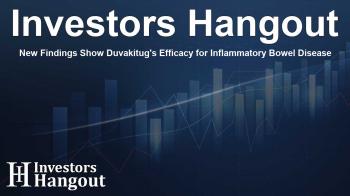New Findings Show Duvakitug's Efficacy for Inflammatory Bowel Disease

Groundbreaking Results from the Duvakitug Study
Teva Pharmaceuticals Industries Ltd. (NYSE: TEVA) and Sanofi SA (NASDAQ: SNY) have recently unveiled promising data from their RELIEVE UCCD Phase 2b study involving duvakitug, a new treatment for moderate-to-severe ulcerative colitis (UC) and Crohn’s disease (CD), two prevalent types of inflammatory bowel disease (IBD).
Presentation Highlights
This significant data was presented at a major Congress of the European Crohn's and Colitis Organisation event, shedding light on the substantial potential of duvakitug in the treatment landscape of IBD.
Ulcerative Colitis Study Results
In the UC cohort of the RELIEVE UCCD study, the efficacy of duvakitug was particularly noteworthy. Out of the patients treated, 36% administered the 450 mg dose and 48% from the 900 mg dose achieved clinical remission as the primary endpoint (mMS) at the 14-week mark.
Comparative Analysis with Placebo
When compared to the placebo group, which had only 20% achieving remission, the placebo-adjusted rates stood at 16% for the 450 mg group and a remarkable 27% for those on the 900 mg regimen.
Subgroup Response
The study further explored the efficacy among different patient subsets, revealing higher clinical remission rates across both advanced therapy (AT)-experienced and AT-naïve groups of patients. Specifically, AT-experienced patients achieved remission rates of 29% with the 450 mg dose and 36% with the 900 mg dose, compared to placebo-adjusted remission rates of 22% and 29% respectively.
In the AT-naïve cohort, the efficacy was even more impressive, with 39% and 53% for the respective doses, leading to adjusted rates of 12% and 26% compared to placebo.
Crohn’s Disease Study Findings
Turning to the CD cohort, duvakitug demonstrated substantial effectiveness as well. In this group, 26% of patients on the 450 mg dose and 48% on the 900 mg dose met the primary endpoint of endoscopic response (SES-CD) at the 14-week evaluation, whereas only 13% of placebo patients achieved the same.
Significant Placebo-Adjusted Results
Placebo-adjusted rates for this study also reflected promising outcomes, showing 13% in the 450 mg group and an impressive 35% in the 900 mg cohort, with respective p-values of 0.058 and <0.001, reinforcing the significance of these findings.
Patient Subgroup Analysis
When examining responses by patient history with advanced therapies, the results were equally impressive. In AT-experienced patients, the endoscopic response rate was 11% for the 450 mg and 48% for the 900 mg, leading to placebo-adjusted responses of 7% and 44% respectively. Meanwhile, AT-naïve patients saw a consistent 47% rate in both dosage groups, with a corresponding placebo adjustment rate of 25%.
Looking Ahead
With these compelling results, both Teva and Sanofi are poised to advance the development of duvakitug into Phase 3 trials, expected to commence in the later part of 2025.
Market Response
In the wake of this announcement, the stock market reflected a slight decline, with TEVA shares trading down 0.18% at $16.70, while SNY shares were down 0.48% at $54.20 during premarket sessions, indicating a cautious response to the overall market sentiment.
Frequently Asked Questions
What is duvakitug?
Duvakitug is a potential treatment for moderate-to-severe ulcerative colitis and Crohn’s disease being developed by Teva Pharmaceuticals and Sanofi.
What were the primary endpoints of the study?
The study measured clinical remission for ulcerative colitis and endoscopic response for Crohn’s disease as the primary endpoints.
When is the Phase 3 program expected to start?
The Phase 3 program for duvakitug is anticipated to begin in the second half of 2025.
What were the results for ulcerative colitis?
In ulcerative colitis, 36% of patients achieved remission with the 450 mg dose and 48% with the 900 mg dose, compared to 20% on placebo.
How did the market respond to the announcement?
After the announcement, Teva's stock decreased by 0.18%, and Sanofi's stock declined by 0.48% during premarket trading.
About The Author
Contact Thomas Cooper privately here. Or send an email with ATTN: Thomas Cooper as the subject to contact@investorshangout.com.
About Investors Hangout
Investors Hangout is a leading online stock forum for financial discussion and learning, offering a wide range of free tools and resources. It draws in traders of all levels, who exchange market knowledge, investigate trading tactics, and keep an eye on industry developments in real time. Featuring financial articles, stock message boards, quotes, charts, company profiles, and live news updates. Through cooperative learning and a wealth of informational resources, it helps users from novices creating their first portfolios to experts honing their techniques. Join Investors Hangout today: https://investorshangout.com/
The content of this article is based on factual, publicly available information and does not represent legal, financial, or investment advice. Investors Hangout does not offer financial advice, and the author is not a licensed financial advisor. Consult a qualified advisor before making any financial or investment decisions based on this article. This article should not be considered advice to purchase, sell, or hold any securities or other investments. If any of the material provided here is inaccurate, please contact us for corrections.

